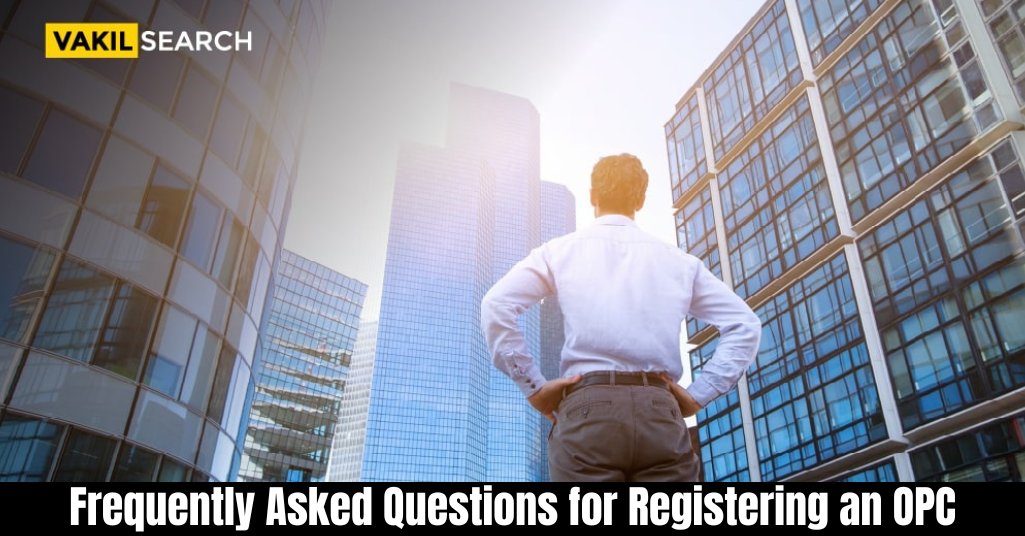The concept of OPC was a brainchild of the Companies Act, 2013. OPCs effectively replace sole proprietorships, in circumstances wherein an individual wishes to kickstart a business as a sole member.
Registering an OPC
A OPC is one of the legal entities that can be incorporated under the Companies Act, 2013. The fact that an OPC has fewer compliances as compared to other corporate structures like Limited Liability Partnership firms or Sole Proprietorship firms, makes it the most worshipped form of legal entity by a number of new businesses.
Despite being easy to be incorporated without complex procedures, there does arise a number of questions pertaining to the registration of an OPC. To make it easier, the most commonly posed questions for registering an opc are collated below:
1. What is a OPC under the Companies Act, 2013?
An OPC is a company that is incorporated by a single person.
2. What is the difference between an OPC and a sole proprietorship?
The most remarkable difference between both is that a sole proprietorship forces unlimited liability on its member, whereas in the case of an OPC the member has limited liability. A sole proprietorship is not given the status of a separate legal entity like that of an OPC. Also, an OPC has a perpetual existence, unlike a sole proprietorship that gets dissolved on the death or the retirement of its members.
3. What is the eligibility to become a member of an OPC?
The member of an OPC should be a natural person who is a citizen of India. It is also pertinent to note that the member should also be a resident of India who has resided in India for not less than a period of 180 days immediately preceding the financial year.
4. Is it compulsory to elect a nominee in an OPC?
Yes, the sole member of the OPC has to mandatorily elect a nominee at the time of registration of the company. The consent of the nominee is taken in Form INC-3.
5. Can a person be a member of more than OPC?
No, a person can be a member of only one OPC at any given time. However, a member of an OPC is not forbidden from becoming a member of any other private company.
6. What are the compliances that need to be adhered to while registering an OPC?
The OPC should conduct at least one board meeting every half of the calendar year and the time gap between the two meetings should not be less than 90days . The book of accounts is to be maintained. The financial statements must be subjected to regular audits. The income tax returns must be duly submitted. The financial statements in Form AOC-4 and the ROC Annual returns in Form MGT are to be furnished.
7. Who is not eligible to incorporate an OPC?
A citizen of a foreign country, a minor, A non-resident of India, any person who does not have the capacity to enter into contractual obligations is not eligible to become a member of an OPC.
8. How many Directors can an OPC have?
An one person company is incorporated with a single member and a single director. Also, there can be a single member who can act both as the member and the director. An OPC can have a minimum of 1 director and a maximum of 15 directors.
9. What are the documents required for registering an OPC?
DIN (Director Identification Number), DSC (Digital Signature Certificate), and PAN (Permanent Account Number) of the director and shareholder. Passport size photographs of the sole member and director. Identity and Address proofs of the shareholder and the director. Proof of address of the registered office of the OPC. The forms stipulated by the Companies Act, 2013.
10. Can an OPC be converted into a private or a public limited company?
Yes, an OPC can be converted to a private limited company by passing a resolution or can be converted mandatorily. The voluntary conversion is done after passing a resolution in the company. The voluntary conversion however cannot happen within 2 years after the incorporation of the one person company. The mandatory conversion takes place when the paid-up share capital of the company exceeds ₹50,000 · Three consecutive financial years have a yearly turnover of more than ₹2 crores Under such circumstances, the OPC is converted to a public or a private limited company within 6 months from the date on which the above stated conditions have arisen.
To know more and make the company formation, reach out to the experts at Vakilsearch for an easy and hassle-free process. Our team provides comprehensive support to ensure all legal requirements are met efficiently. Let Vakilsearch guide you through every step of the company formation journey
Also, OPC: Crafting legacies, one registration at a time. By choosing the one person company structure, entrepreneurs can enjoy the benefits of limited liability while maintaining full control over their business. This model is ideal for solo founders looking to create a lasting impact with their ventures.




